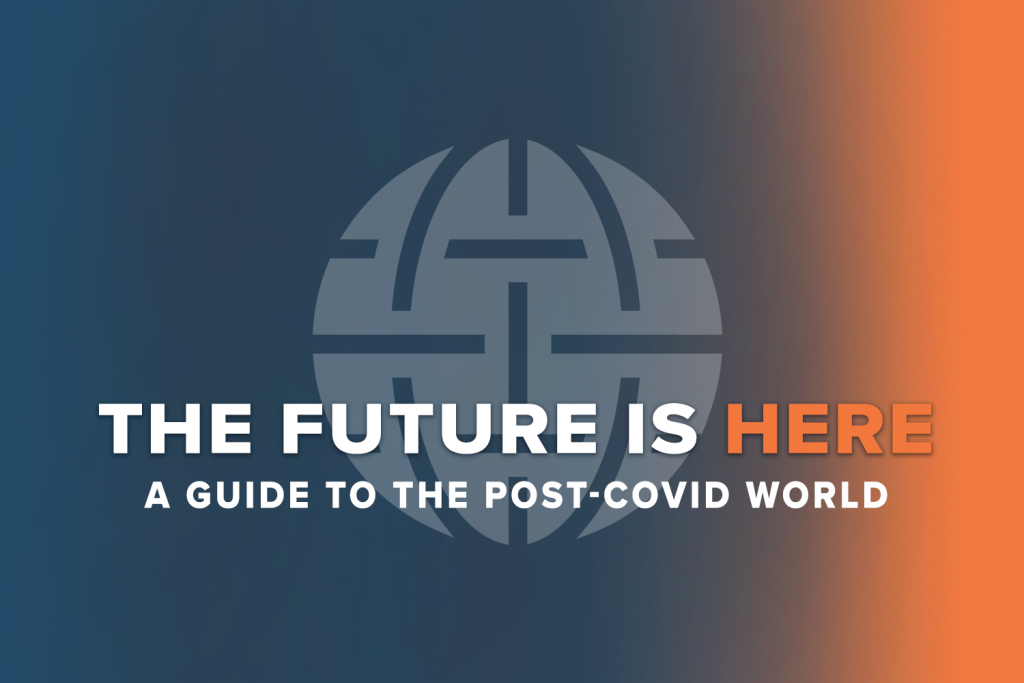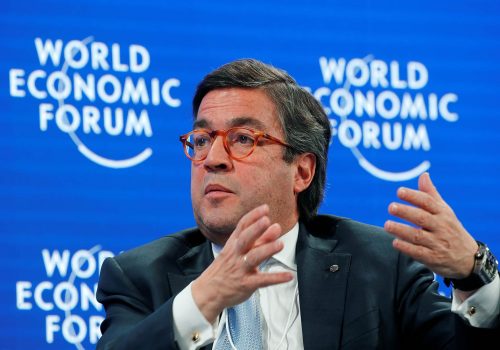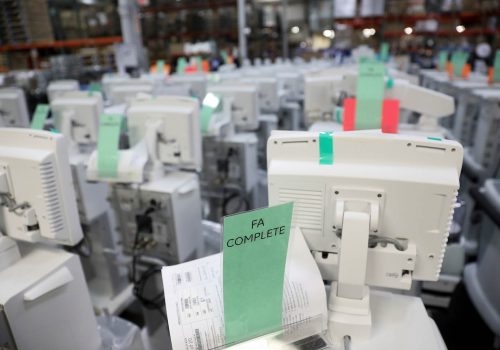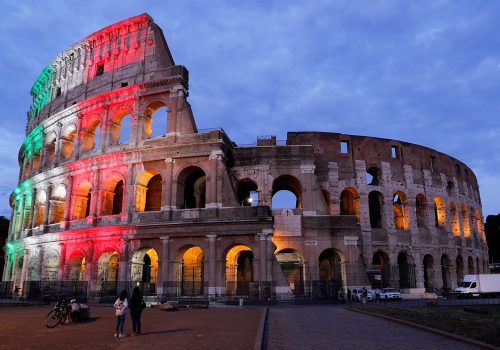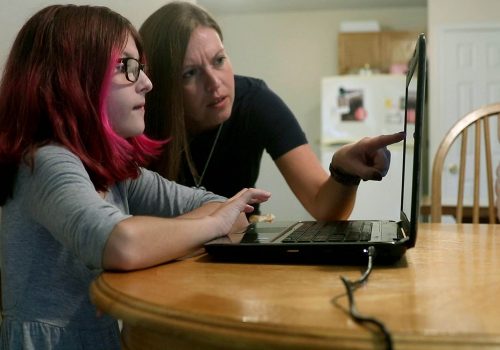The future is here: A guide to the post-COVID world 09/18/2020
Welcome to your guide to where the world is headed during the pandemic era and beyond. Each week, we’ll bring you the latest and most significant expert insights and international news about how coronavirus is reshaping international affairs. To stay updated each week, sign up to the newsletter here.
Let’s take a spin around the globe, in seven minutes or less.
In top stories this week:
- The pandemic has undone twenty-five years of progress on global vaccine coverage in twenty-five weeks, the Gates Foundation has warned.
- The damage to the global economy, though still unprecedented, might not be as severe as expected, according to the OECD.
- Less air travel = the biggest airline debt deal ever; less ferry travel = more dolphin sightings.
- But first… we have a special dispatch from Benjamin Haddad and Eileen Kannengeiser of the Atlantic Council’s Future Europe Initiative. Here’s their take on this week’s big story:
The big story
This week’s key theme: Beneath the din of the COVID-19 crisis, there are rumblings of a new Europe.
It sounds like a cliché to say that it takes a crisis for Europe to act, but in the case of COVID-19 there’s truth to it. In a new essay for the Atlantic Council, Clément Beaune, France’s minister for European affairs, offers one of the most detailed visions yet from a top European official about what a post-COVID Europe could look like.
The European Union’s adoption this summer of an economic-recovery package, including an agreement to share debt, represents “the most important boost to European integration since the euro,” Beaune argues, as well as “the return of a golden triangle” in “the French-German partnership and an ambitious European Commission.”
The case for a ‘power agenda’
But while the pandemic has shown the EU to be “responsive in the economic sphere,” Beaune notes, it has also exposed the bloc as “largely powerless” to coordinate border restrictions and “practically nonexistent” on health matters such as common quarantine measures and vaccine research.
The EU, he maintains, must develop a new “power agenda” to navigate “the stark world that the Europeans are rediscovering,” shaped not just by the coronavirus crisis but also by “tremors from the China-US clash.”
Even as he places the Franco-German engine at the core of this new European project, Beaune does not paper over the disagreements between the two countries on Eurozone reform and the Nord Stream II pipeline. Noting French President Emmanuel Macron’s conviction that “Europe is not the dilution of, but the condition for, French sovereignty in today’s world,” Beaune explicitly links France’s attachment to its power, identity, and independence to European global power.
“This strengthening of France through Europe has taken on a worldwide dimension,” he writes. “How can strategic industrial sectors, from the electric battery to essential medicines, be developed through national self-sufficiency rather than European autonomy? How can the trade agreements governing globalization be achieved in a single country?”
The bottom line: Pursuing this agenda will present significant challenges, Beaune acknowledges. Europe will need to reconcile “the language of power” with “the grammar of cooperation.” It will need to reassess its passion for enlargement, instead setting clear borders and strengthening standards for accession. And it will need to reckon with its complex network of leadership. Invoking Henry Kissinger, Beaune notes that “Europe nowadays has several telephone numbers, but no direct line.”
– Benjamin Haddad and Eileen Kannengeiser, Future Europe Initiative
Subscribe to The future is here: A guide to the post-COVID world
Sign up for a weekly roundup of top expert insights and international news about how coronavirus is reshaping international affairs.

The big picture
This week’s theme, visualized: What Europeans really want
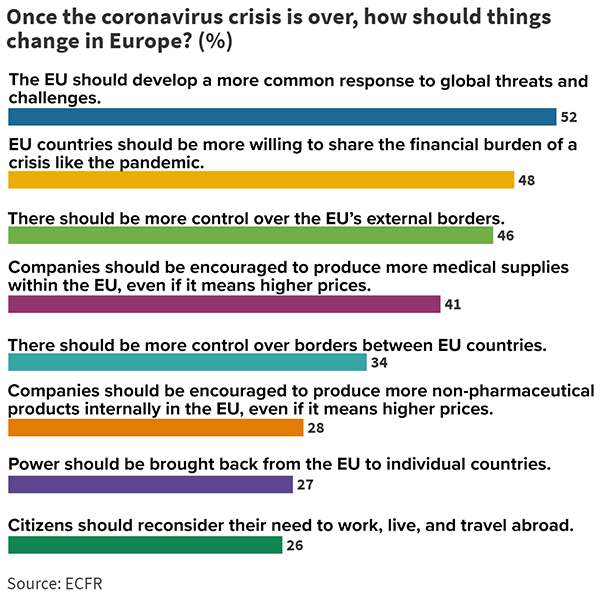
The world in brief
Insights from across the planet, in ten bullets or fewer
- United Nations Secretary-General António Guterres will call for a global ceasefire through the end of 2020 in his annual address to world leaders next week, Reuters says, in order to enable countries to fight the pandemic. As the UN turns seventy-five and prepares for a virtual gathering, celebrations are “muted by calamity and conflict,” as The New York Times puts it, with the pandemic and rising world tensions overshadowing the organization’s achievements.
- It may take the global economy as long as five years to recover from a recession caused by coronavirus, Reuters cites World Bank chief economist Carmen Reinhart as saying. The Federal Reserve pledged to keep interest rates low for as long as the US economy needs to recover from the pandemic, but investors balked at a lack of new stimulus measures, the newswire noted. And as hopes fade for $1 trillion in new stimulus from the US government, Wall Street and economists are flagging the danger of a weaker and more uneven US economic recovery, the Financial Times says.
- But the pandemic’s damage to the global economy may be less than expected. The Organization for Economic Cooperation and Development (OECD) is predicting that the economy will contract by (a still unprecedented) 4.5 percent, compared with its June forecast of 6 percent, the BBC says. But the recovery is losing pace and governments and central banks will need to provide support for a while yet, Bloomberg cites the OECD as saying. Rather than economy-wide support, the OECD now wants governments to focus on targeted measures that bolster new forms of growth, the Financial Times says.
- In China, consumer spending is catching up with the wider economic recovery. In the most recent sign, retail sales in the country grew for the first time since the pandemic began, according to the Financial Times. Sales were up 0.5 percent in August from a year earlier, driven by shoppers and cinemagoers, The Wall Street Journal says.
- Rich countries need to ensure COVID-19 vaccines can be produced globally, or else risk increasing mortality rates from the virus, the Bill and Melinda Gates Foundation says. The grim warning stems from inequity in vaccine pre-orders by rich countries, Quartz cites the foundation as noting. In twenty-five weeks, the pandemic has undone twenty-five years of progress on global vaccine coverage, the Gates Foundation has warned.
- Vaccine development is a work in progress. US drug developer Novavax is doubling its potential COVID-19 vaccine-making capacity to two billion doses a year by mid-2021 under a deal with India’s Serum Institute, Reuters says. Meanwhile the neurological symptoms experienced by a UK participant, which caused the University of Oxford and its partner AstraZeneca to pause their vaccine trials, probably weren’t related to the shot itself, Bloomberg reports. And fifteen scientists from five countries expressed doubts about the accuracy of early data on Russia’s COVID-19 vaccine, Reuters also says.
- The path ahead for energy demand is “treacherous” as COVID cases increase, says the International Energy Agency. Its closely watched monthly report cut the forecast for 2020 oil demand, CNBC reports. The economic fallout from COVID-19 will hit worldwide energy demand harder and for longer than previously thought, The Wall Street Journal cites the Organization of the Petroleum Exporting Countries as saying. And now an intense search is on for tankers to store diesel and jet fuel at sea, Bloomberg says.
- QUOTE: “COVID-19 has been simultaneously good and bad for humanity’s struggle to limit global warming,” writes Andreas Kluth in Bloomberg. “So far, it’s hard to say what the net balance will be. But the European Union could tilt it positive, if it so chooses.”
- In the largest airline debt deal ever, Delta is raising nine billion dollars from investors as it tries to weather a downturn in travel demand. The pandemic’s impact on flying is causing the airline to burn through $27 million a day, Bloomberg says. In India, airlines are seeking at least $1.5 billion in interest-free credit lines from the government as they too deal with the hit to air travel, the newswire also reports.
- Less travel means more rare dolphin sightings—and other oddities. A pandemic-induced pause in high-speed ferry travel from Hong Kong to Macau has led to a jump in sightings of Indo-Pacific humpback dolphins in parts of the Pearl River Delta, Reuters says. Or, for those hankering for airline travel, how about a trip to nowhere? A seven-hour flight by Qantas that returns to the same airport sold out in less than ten minutes, after similar departures in Taiwan and Japan, The Washington Post reports. Singapore Airlines is mulling a go-nowhere flight too, the Straits Times says.
The inside scoop
Insights from the Atlantic Council
Collective wisdom
Observations from our community
We want to learn from you. What are you noticing in your area of expertise or corner of the world about where the post-COVID international system is headed?
Email editor@atlanticcouncil.org with your thoughts about how the coronavirus crisis is playing out in your world, and you may be featured in an upcoming edition.
